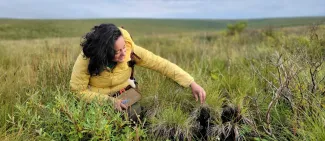How will species persist if the pressures of wildfire amplify under a warmer climate?
Plants and animals have co-existed and evolved with wildfire for millennia. As climate continues to rapidly change around us and wildfire frequency increases worldwide, diverse biological communities will likely evolve new adaptations in response to such changes. However, the evolutionary pressure of wildfire on species has received less attention compared with the ecological impacts of wildfire on plants and their communities. An editorial by Santos et al. (2023) addressed this gap in wildfire research by synthesizing studies that contribute to the perspective of wildfire as a dynamic ecological and evolutionary force. Themes in the Special Feature highlighted by the editorial included arctic-relevant topics such as new approaches to investigating vegetation-wildfire feedbacks and resulting plant syndromes, and wildfire impacts on plant-fungal interactions. Incorporating evolutionary concepts and perspectives into future frameworks is essential to understand how species will persist given that the pressures of wildfire are anticipated to be amplified under a warmer climate. Recommendations that will enable our scientific community to better understand the ecological and evolutionary consequences of wildfire included development of ecological and evolutionary databases for wildfire ecology, integration of hierarchical genetic or phylogenetic structures, and development of new experimental frameworks that limit context-dependent outcomes. This new science will be facilitated by the establishment of networks, formation of interdisciplinary partnerships, unification of the way we measure responses to wildfire, and incorporation of knowledge from diverse communities.
Citation: Santos F, Bailey JK, Schweitzer JA. 2023. The eco-evolutionary role of fire in shaping terrestrial ecosystems. Functional Ecology 37: 2090–2095. https://doi.org/10.1111/1365-2435.14387.
Contact and email address: Fernanda Santos (santosf@ornl.gov)


